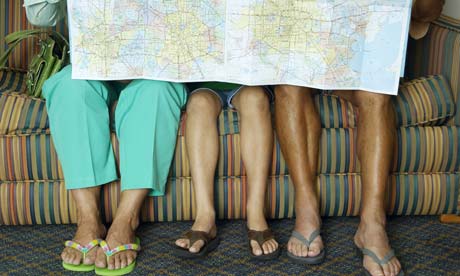
Couchsurfing – the website that allows users to stay for free in other people's homes – has moved away from its not-for-profit roots. The eight-year-old site (couchsurfing.org) has just accepted £4.7m from venture capitalist Benchmark Capital and Omidyar Network, set up as a philanthropic investment firm by eBay founder Pierre Omidyar.
The decision has divided members. Some – especially those who have donated time as volunteers – feel strongly that it should remain a non-profit organisation. Others are wondering what took them so long.
Once an innovative leader in an emerging field of social networking, Couchsurfing's development became frustratingly stilted over the years, despite signing up more than three million members. Superficial evolution – a design tweak here, a new logo there – is as much progress as many members have seen in recent times.
Meanwhile, newcomers have come along, racking up profits and press coverage, and looking pretty stylish in the process. The most notable example is AirBnB.com, a site that took the same idea of people sharing their homes with travellers, but instead charged them a fee for bookings and thus propelled itself to a valuation of £1.3bn in just three years.
Couchsurfing co-founder Casey Fenton said of the change: "It may not be what any of us expected, it may even seem a little scary, but I believe that it is actually the best thing that could have happened."
He has confirmed that the company will become a "B Corporation", a new class of enterprise in the US that is said to "use the power of business to create public benefit". The site had previously been seeking charity status.
So what does this mean for members? Couchsurfing has said it will remain free, but new paid-for features will be added. Maybe we will see more social media tie-ins – the new investors have links to Twitter and Wikimedia. Security will almost certainly be addressed. AirBnB has just introduced a $50,000 security guarantee for its members, after it experienced a PR disaster when a host's home was vandalised.
Meanwhile, Tripping – a relatively little-known newcomer that recently secured more than £600,000 funding – has installed a system whereby travellers have to pass a Skype interview – showing a "virtual bouncer" some identification – to make members more traceable.
And what about those who have donated hours of time to Couchsurfing.com over the years? Will they have to pay for the upgrade or will they be rewarded with any other benefits? "Will my money and hours given to this organisation be converted to stock? Or am I just being mugged after all these years?" asked one member on the site's forum.
After this week's announcement, there is talk of a mutiny – as when an unhappy group of HospitalityClub.org users split off to form BeWelcome.org in 2007 – but it is unlikely to have any effect; the site's reach is too huge and most users are simply looking for a free place to crash and have no interest in the background politics.
Meanwhile, Couchsurfing may not be able to catch AirBnB – and it claims it would not want to – but it could be back making headlines again soon.
• Read about more ways to stay with locals here and follow Vicky Baker's Couchsurfing experiences here

